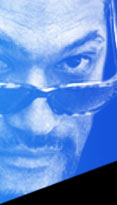"We had a script and everything, but the dialogue, what we did on the boat, that was up to us to create," Fishburne says. "Francis would say, 'The scene starts here and the scene ends here. This is basically what you're doing. How you get there, that's up to you.'" In Fishburne's mind, Coppola was essentially saying: OK, go. Do what it takes. Improvise. Create. Spread your wings and fly, baby. But beware: you won't be getting any parachute from me. What, ultimately, did Coppola want from his actors? Fisburne is clear: "A moment of combustion."
Week after week, month after month, Coppola's approach kept young Fishburne on the razor's edge, balanced precariously between a sense of power and a sense of terror. "He gave us the window to create, but it was also really scary," Fishburne says. "Because you are responsible. Francis's message was clear: 'I'm not telling you what to say. I'm not putting words in your mouth. I'm not putting thoughts in your head. So if the shit comes out and it's fucked up, that's on you.'"
Fishburne never went to acting school; this was his acting school. This was where he forged his skills; this was where he forged his mindset and his artistic credo. These came in part from the great actors around him but also from watching many of the people Coppola had recruited for his production team. People like the legendary Italian cinematographer Vittorio Storaro.
"I'd be sitting there watching Vittorio do his thing," Fishburne recalls, "and often Vittorio would turn to Francis and say, 'I wonder, you know, if it would be possible for us to wait two weeks for this shot, to get the right light?' Two weeks! And Francis would go, 'OK, maestro, if that's what we have to do, that's what we have to do.'"

